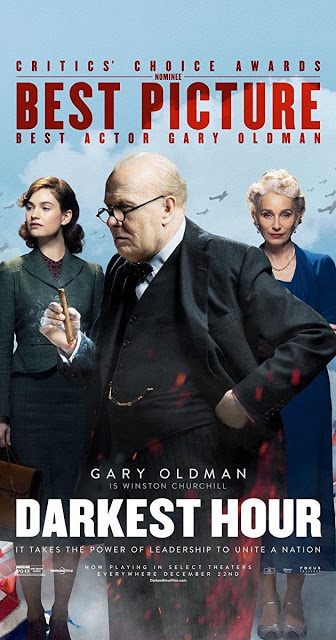‘Darkest Hour’
Reading Time: 3 minutes

In light of the glowing reviews of Darkest Hour, I have hesitated to share my thought on this blockbuster.
The subject matter of the film is Winston Churchill (played by the unrecognisable Gary Oldman) taking over as Prime Minister of Britain, because Lord Chamberlain, (played by Ronald Pickup,whom we fondly remember from the Marigold Hotel films) was unacceptable to the opposition, and thus unable to form a bipartisan government.
The film culminates in Churchill’s stirring speech (We shall fight them on the beaches…) for which we most remember him.
The film’s scenes are largely set in the underground war command centre, No 10 Downing Street, and in Westminster. We are introduced to Churchill as a widely disliked, grumpy, privileged, eccentric, ever drunk, and rude individual kept in check by his wife Clementine (presented very convincingly by Kristin Scott Thomas). To some extent we see Churchill through the eyes of his resilient young secretary, Lily James (Elizabeth Layton), a perspective that highlights his many flaws, and oratory skill, and which, particularly in one memorable scene, reveals the implications of some of Churchill’s seemingly cavalier decisions.
Churchill is appointed Prime Minister by a reluctant and concerned King George VI (portrayed by Australian actor, Ben Mendelsohn, who currently seems to be in demand for supporting roles). I found the King’s lines and costumes to be somewhat artificial and much more suited to stage than screen.
In my view the film undermines (perhaps deliberately) Churchill’s standing as the hero of the World War II and the saviour of Britain. When pressured into considering a negotiated peace, Churchill outlines an option that would see Central Europe and other areas ceded to Germany, in exchange for an autonomous Britain. While he backs away from this option, he does so seemingly only because he does not expect Germany to agree to such terms. This proposal is telling, as at the end of the war Churchill did sell-out Central and Eastern Europe to the Soviet Union in exchange for Britain not having to continue fighting to protect the independence of these British allies. He is shown to opt for fighting for the nation rather than negotiating peace, because of his sense that this is what the people want. This view, the film presents as being gained through the fictitious, but perhaps most entertaining scene of the film — of Churchill taking an unscheduled ride on a train. His stirring speech and resolve to fight against overwhelming odds is therefore presented as a reflection of public sentiment rather than an inspirational call to arms that reassured and inspired the nation to fight, and is only supported by his side of parliament when it secures the last minute support of the dying Lord Chamberlain.
Arguably this ‘filmed-play’ may, in my view, have been more complete as a film, if it actually showed the context of the people’s views about the war and looming threat, and more than a glimpse of Dunkirk. The footage that is shown is akin to footage that may be shown above a play’s stage rather than an integral part of a film. A number of peripheral themes were also introduced but not at all further developed. For example on the one occasion that the Churchill family is shown together, it is clear that they are not close-knit nor united. How this affects Churchill or is relevant is left unknown. Only Churchill’s secretary, Lilly, and to a lesser extent, Clementine offer some links to the ‘real world’ outside the War Cabinet.
However, this rather negative review may in part reflect the recent spate of cinema and television presentations of Churchill and of this period of British history. Where other presentations seemed more realistic and memorable, this film suffers in comparison. It may also in part suffer from ‘grumpy old man syndrome’, brought on by a very elderly couple seated behind us at the cinema, who repeated lines to each other, and whispered loudly, noting who they liked most and predicting what would happen next.
We did not regret seeing this film, and particularly Gary Oldman’s Golden Globe Award winning performance as Churchill, but I was disappointed that this otherwise fine film seemed to be so flawed.
(Visited 21 times, 1 visits today)